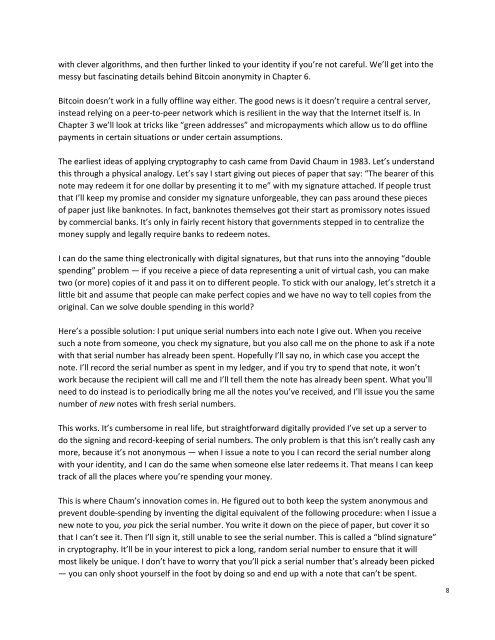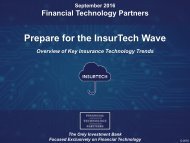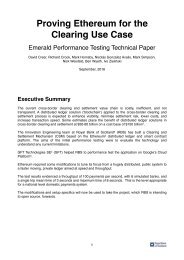Bitcoin and Cryptocurrency Technologies
1Qqc4BN
1Qqc4BN
You also want an ePaper? Increase the reach of your titles
YUMPU automatically turns print PDFs into web optimized ePapers that Google loves.
with clever algorithms, <strong>and</strong> then further linked to your identity if you’re not careful. We’ll get into the<br />
messy but fascinating details behind <strong>Bitcoin</strong> anonymity in Chapter 6.<br />
<strong>Bitcoin</strong> doesn’t work in a fully offline way either. The good news is it doesn’t require a central server,<br />
instead relying on a peer-to-peer network which is resilient in the way that the Internet itself is. In<br />
Chapter 3 we’ll look at tricks like “green addresses” <strong>and</strong> micropayments which allow us to do offline<br />
payments in certain situations or under certain assumptions.<br />
The earliest ideas of applying cryptography to cash came from David Chaum in 1983. Let’s underst<strong>and</strong><br />
this through a physical analogy. Let’s say I start giving out pieces of paper that say: “The bearer of this<br />
note may redeem it for one dollar by presenting it to me” with my signature attached. If people trust<br />
that I’ll keep my promise <strong>and</strong> consider my signature unforgeable, they can pass around these pieces<br />
of paper just like banknotes. In fact, banknotes themselves got their start as promissory notes issued<br />
by commercial banks. It’s only in fairly recent history that governments stepped in to centralize the<br />
money supply <strong>and</strong> legally require banks to redeem notes.<br />
I can do the same thing electronically with digital signatures, but that runs into the annoying “double<br />
spending” problem — if you receive a piece of data representing a unit of virtual cash, you can make<br />
two (or more) copies of it <strong>and</strong> pass it on to different people. To stick with our analogy, let’s stretch it a<br />
little bit <strong>and</strong> assume that people can make perfect copies <strong>and</strong> we have no way to tell copies from the<br />
original. Can we solve double spending in this world?<br />
Here’s a possible solution: I put unique serial numbers into each note I give out. When you receive<br />
such a note from someone, you check my signature, but you also call me on the phone to ask if a note<br />
with that serial number has already been spent. Hopefully I’ll say no, in which case you accept the<br />
note. I’ll record the serial number as spent in my ledger, <strong>and</strong> if you try to spend that note, it won’t<br />
work because the recipient will call me <strong>and</strong> I’ll tell them the note has already been spent. What you’ll<br />
need to do instead is to periodically bring me all the notes you’ve received, <strong>and</strong> I’ll issue you the same<br />
number of newnotes with fresh serial numbers.<br />
This works. It’s cumbersome in real life, but straightforward digitally provided I’ve set up a server to<br />
do the signing <strong>and</strong> record-keeping of serial numbers. The only problem is that this isn’t really cash any<br />
more, because it’s not anonymous — when I issue a note to you I can record the serial number along<br />
with your identity, <strong>and</strong> I can do the same when someone else later redeems it. That means I can keep<br />
track of all the places where you’re spending your money.<br />
This is where Chaum’s innovation comes in. He figured out to both keep the system anonymous <strong>and</strong><br />
prevent double-spending by inventing the digital equivalent of the following procedure: when I issue a<br />
new note to you, youpick the serial number. You write it down on the piece of paper, but cover it so<br />
that I can’t see it. Then I’ll sign it, still unable to see the serial number. This is called a “blind signature”<br />
in cryptography. It’ll be in your interest to pick a long, r<strong>and</strong>om serial number to ensure that it will<br />
most likely be unique. I don’t have to worry that you’ll pick a serial number that’s already been picked<br />
— you can only shoot yourself in the foot by doing so <strong>and</strong> end up with a note that can’t be spent.<br />
8









